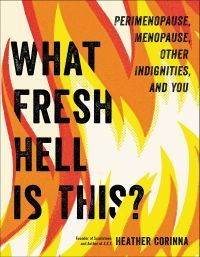
Where Are All the Menopause Books That Don’t Demonize Aging?
Since turning 41 (still a baby, I suppose), I’ve begun to notice that my body is not as resilient as it once was. I can no longer sit criss-cross applesauce for any length of time without a deep aching in my right hip. If I try to walk swiftly whilst wearing flip-flops, my right knee stiffens up. When I wake up in the middle of the night to pee for the five billionth time, I find myself limping to the bathroom, pain radiating through my feet and ankles. I feel it’s only a matter of time until I tumble down the stairs in the dark.
I also can’t drink wine anymore without getting acid reflux. I can’t eat anything anymore without getting constipated and/or bloated. My chronic fatigue has intensified, my patience has worn thin, my cholesterol has skyrocketed, and I can’t carry more than two thoughts in my head at once.
I am seriously losing my edge.
I once asked the internet: Is it perimenopause, the pandemic, or my personality?
I suspect the answer is all three.
Still, there are things I like about aging. The fact that I (mostly) have my shit together. The fact that, suddenly, I have zero fucks left to give.
I am told the latter is something that comes with maturity and wisdom.
Sure. We’ll go with that.
Where Are All the Books That Embrace the Glories of Aging?
When it comes to books about perimenopause and menopause, the pickings are slim. About three years ago (though it feels much longer), I attended a book launch for What Would Virginia Woolf Do?, a book for women 40 and up written by the founder of a Facebook group of the same name. The event was a delight and I couldn’t help but admire the community the author had built around herself.
When I took a copy of the book home, however, I was disappointed. The tone seemed to be that of someone who viewed aging as a fate worse than death. The topics were pretty shallow. And the advice itself didn’t seem grounded in actual expert research.
Three years later, when I google books about menopause, the landscape isn’t much better. I see books that promise to deliver the solution to menopause as if menopause is a problem to be solved rather than a natural part of growing older. I see books for husbands who cannot handle what their wives have become. (Werewolves? Witches? Crones?) I see books that urge women to engage in intermittent fasting and other forms of disordered eating in order to lose weight later in life.
What the what now? What happened to not giving a fuck!?
Is 2021 the Year of the Menopausal Woman?
OK. I know. The past two years have been a shitshow. But suddenly, I’m seeing a whole rush of actually good books about menopause and perimenopause.
In the lead-up to 2020, Darcy Steinke wrote a by-god memoir about menopause called Flash Count Diary, which goes beyond hot flashes to talk about ageism, gender, and more. Meanwhile, Arianna Sholes-Douglas, MD, wrote a more instructive and prescriptive book called The Menopause Myth, which aims to demystify this totally normal life transition. Because while this stage of life can be just as confusing as puberty — and, again, is just as normal — no one prepares folks for these changes in quite the same way they prepare pre-teens for body hair and breasts.
In August of 2020, Menopause: A Comic Treatment snuck onto my wishlist, a graphic compendium of personal stories by folks going through it. The stories in this collection are filled with humor and honesty and are shared with great generosity.
Then 2021 came and the clouds parted and the angels sang and, sure, life still sucked (see: enduring pandemic), but there was suddenly a shit-ton of books to read about perimenopause and menopause.
Jen Gunter, a gynecologist specializing in chronic pain and vulvovaginal disorders, wrote The Menopause Manifesto. In it, she treats menopause not as a disease but as any other expected change in one’s life, one you can prepare for with confidence given the right information.
Also in 2021, Nicole E. Williams, MD, wrote This Is How You Vagina (I mean…the title alone) while Zoe Mendelson and Maria Conejo released Pussypedia. Neither book has menopause as its focus, but they both have hefty, research-driven sections that demystify genital and reproductive changes during that time of one’s life.

And then there’s Heather Corinna’s What Fresh Hell Is This?, one of the smartest, most accessible, and most inclusive books I’ve ever read on perimenopause and menopause. Which makes sense because Corinna is a badass sexuality educator who founded Scarleteen and who also wrote an amazing sex-positive guide to sexuality for teens.
In What Fresh Hell Is This?, Corinna addresses everything from the basic bodily changes to be expected during perimenopause and menopause to the psychological changes you may experience to what sort of medical help you may (or may not) want to seek out. And while they don’t pretend that a lot of it doesn’t suck, they also don’t demonize aging in the way so many other authors do.
And through it all, while they acknowledge that the majority of people who experience these changes are women, they also point out that perimenopause and menopause are experienced by intersex people, trans men, nonbinary folks, genderqueer folks, agender folks, and other gender-diverse folks. There’s even an appendix for those assigned male at birth. Can I get an amen?
There’s Still Work to Be Done
I mean, Corinna’s book is pretty damn fantastic, but there’s always room for more. For example, I haven’t found a menopause manual that acknowledges and focuses on the health disparities faced by Black women since 2003’s Black Woman’s Guide to Menopause.
Also, many of the books I’m familiar with that were written for LGBTQ+ folks were written for teens, and they don’t go anywhere near the older years. Though there is this fascinating title I just stumbled upon — Musings on Perimenopause and Menopause: Identity, Experience, Transition — which also came out this year. What the hell is in the water in 2021!? And can someone please get me this book for Christmas?
I can only hope that this glut of menopause titles is just the beginning and that we’ll soon see many more titles from many more diverse voices.
In the meantime, I’ve dog-eared Corinna’s sections on sleep struggles, medical specialists, anger, digestion, vaginal dryness, and the bullshit that is diet culture. These are the things that already feel relevant to me, but I’m sure this book will remain useful for years to come.








